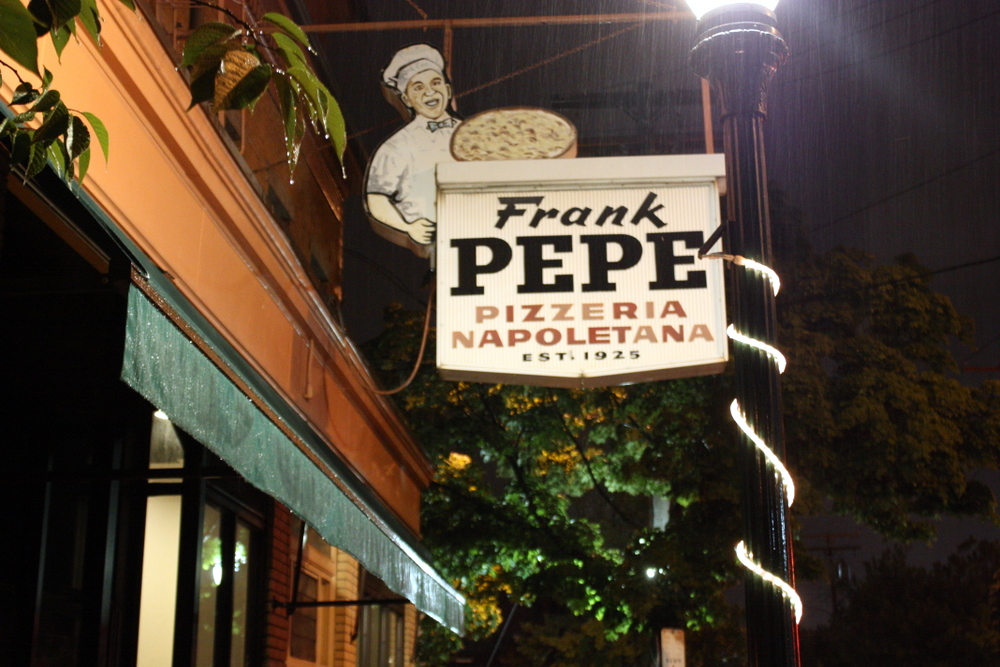
Frank Pepe Pizzeria Napoletana in New Haven, Connecticut (Flickr/Krista)
Phil Lawler is one of the most tendentious of Pope Francis' critics, and his latest column at the CatholicCulture website is no exception. I love the way conservatives pretend that most post-conciliar liturgies are, at best, mediocre, while not admitting that most pre-conciliar liturgies were pretty bad, too. The quality of most priests' Latin was atrocious, nearly ig-pay atin-Lay bad. But what really is galling is when he misquotes Pope Benedict XVI, writing, "Pope Benedict had persuaded us that we should read the Council with a 'hermeneutic of continuity,' realizing that the teachings of the Church in the 1960s must necessarily be compatible with her teachings in the 1660s or the 560s." Benedict said nothing of the sort, as I have pointed out countless times. He did, in his famous 2005 address to the Curia, criticize a hermeneutic of rupture and recommended a "hermeneutic of reform," which contained elements of both continuity and discontinuity. Conservative U.S. Catholics distorted both Popes John Paul II and Benedict XVI when it suited their purpose. And if Lawler really wants to return to the church of the 1950s, he should pipe down and pay, pray and obey.
Another critic of Francis, Fr. Robert Sirico, former gay rights activist and later founder of the libertarian Acton Institute, took to the pages of Fox News to register his complaints about the pope's restrictions against the Tridentine rite. His take on this papacy as compared with its predecessors is laughable: "But popes aren't presidents. The papacy is supposed to eschew politics and instead focus on the spiritual needs of the faithful. That was the late Pope John Paul II's approach. As was Pope emeritus Benedict XVI's." Right.
At Politico, congressional reporter Nicholas Wu looks at the state of the investigation by the House Select Committee into the Jan. 6, 2021, attack on the U.S. Capitol. He says the committee is now looking at how pressure was applied at the state level by Trump and his allies, and there is evidence of a great deal of felonious behavior. The committee is also watching the calendar, mindful that public hearings need to happen before the Dems lose their majority in the midterm elections. We can all hope more Republicans will show themselves to be Americans first and partisans second, but I am not holding my breath.
Advertisement
In The Washington Post, my old college professor Norman Ornstein explains five myths about the filibuster, myths that somehow seem to evade its supporters. Back in 1981, Ornstein knew more about Congress than anyone I had ever met — and he still does.
Also in the Post, E.J. Dionne rightly defends Attorney General Merrick Garland's care and caution as he proceeds with prosecutions related to the attack on the Capitol last year, and more generally, his effort to depoliticize the Justice Department. This is especially the case if Garland decides to indict former President Donald Trump. Dionne reminds us that several Republicans, including Sen. Mitch McConnell, explained their vote to acquit Trump during his second impeachment trial in part by noting that he could be indicted for any crimes once he left office.
The New York Times reports on a writer's lawsuit against the Atlantic magazine, charging the magazine defamed her when it retracted an article of hers that it published in 2020. The writer, Ruth Shalit Barrett, faced credible allegations of plagiarism in the 1990s when she worked at The New Republic. The whole thing is a mess and worse: At a time in the history of our democracy when it is more important than ever that those of us in the media are credible and honest and fearless, fabricating parts of a story is simply not acceptable.
At the website Tiny Trips, an assessment of who has the best pizza. Unsurprisingly, it is not Italy or New York or Chicago but Connecticut. If you have never had a clam pizza at Frank Pepe's in New Haven or at Mono in Middletown, you really have not lived.







